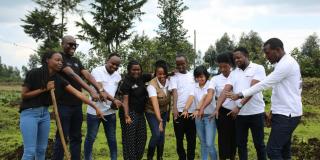
"My name is Trojan Twagirayezu, and I work as a Project Officer for VSO on the ACTIVE project in Rwanda. My role involves supporting vulnerable and marginalised groups, particularly women, youth, girls, and people with disabilities to become active citizens and empower them to exercise their rights.
The role also involves engaging the youth to be agent of transformation in community development and contributing to the achievements of Sustainable Development Goals (SDGS) through volunteerism for development.
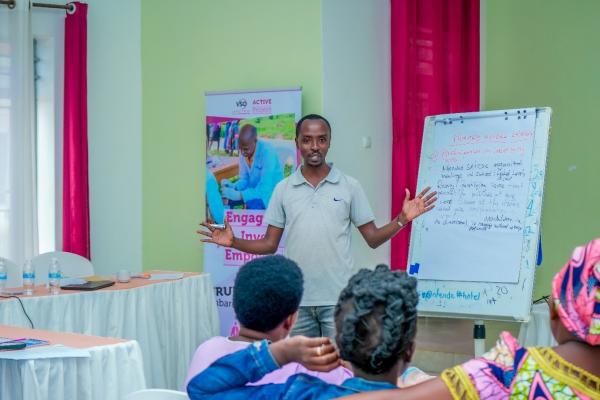
I provide support to uptake and adopt the global volunteering standards among our partner NGOs and government to enhance the best practices of volunteering for development. My colleagues and I support girls, youth, women, people with disabilities, and parents in demanding their rights by using community scorecards to complement other existing education and livelihoods focused projects in Rwanda like Let’s Learn Through Play and Make Way.
I also gather evidence demonstrating the impact of our volunteering for development method, by compiling case studies and research papers.
What inspired you to work in the non-profit and development sector, and what about VSO’s vision resonated with you?
Before moving into the non-profit sector, I spent five years working for profit-driven companies, including as a sustainable agriculture management representative officer at Shagasha Tea Company Ltd, which was owned by The Wood Foundation for Africa.
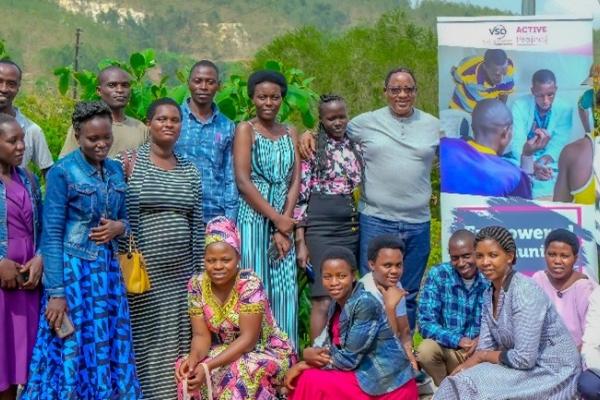
While I was there, I saw first-hand the positive impact of empowering small farmers and promoting social economy. That experience inspired me to focus more on non-profit work, where I could contribute to lasting change in the communities.
I had seen VSO posters around and got curious about the organisation. After researching, I learned that VSO aims to create a fairer world for everyone through volunteering and inclusive development. This vision resonated with me, and I was particularly drawn to the way VSO brings together people with diverse skills and experiences from all over the world to work together to achieve this vision. This inclusive approach made me feel like VSO was the place where I could have a meaningful impact.
How did you come across this opportunity and what inspired you to join ACTIVE project?
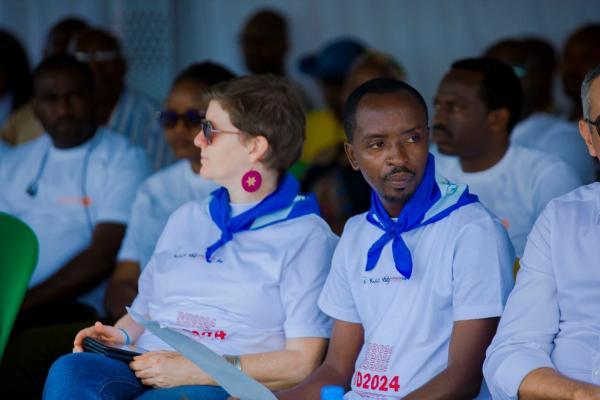
Before joining VSO, I worked with other international NGOs, such as Good Neighbours International, where I served as a social and finance enterprise coordinator.
After the project I was working on ended, I came across a job posting for a field operations officer role for the Building Learning Foundations project (BLF). I was looking for a new opportunity post-COVID and, as I said, was already drawn to VSO’s volunteering for development approach, so I applied and was offered the job in November 2021.
The BLF project was large, and I was responsible for supporting volunteers across three districts. My duties included managing logistics, such as hotel bookings and transportation, distributing materials to schools, and collecting data from the field.
When that project ended, an opportunity arose within ACTIVE project. VSO gave us, 10 staff members, a chance to apply for positions, and I was selected as a Project Officer on the programme.
Can you share some key highlights and challenges of your role?
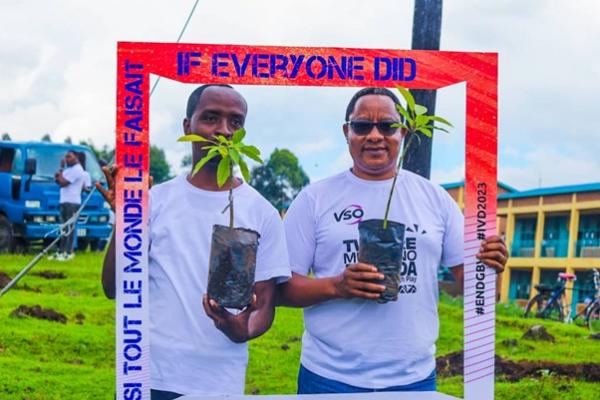
One of the most gratifying parts of my work is empowering marginalised groups, particularly youth networks, women, girls, and people with disabilities to become active citizens. For example, supporting the youth to engage in peacebuilding, unification and reconciliation among Rwandans as well as with the rest of the world.
I facilitated investigations into educational priorities both in and out of school. I’ve also been the focal person for global leadership in promoting the Global Volunteering Standards, helping partners adopt these standards.
A key challenge we face is the limited funding, despite having a large scope of work. For instance, we work with the National Youth Council, which has over 2 million youth volunteers across Rwanda. However, with limited funds, we can only focus on a few districts.
Another challenge has been supporting partners who want to adopt global volunteering standards but require resources, such as developing a human resources manual, which can be costly. Lastly, natural disasters, such as heavy rains, have destroyed infrastructure and impacted the communities we serve, creating additional challenges.
What do you think makes a good project officer or a programme leader?
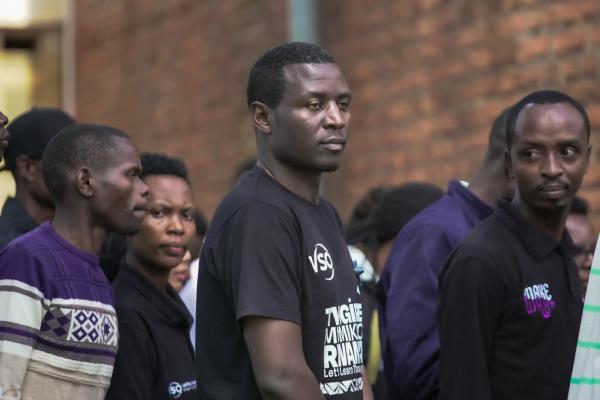
A successful project leader must thoroughly understand the project: its detailed design, the key stakeholders, required resources, and timelines and be a be able to work well and closely with own line manager and the donors.
Planning is essential, as well as doing effective monitoring and reporting on time. In VSO, we use MILE cycle method (Measuring Impact, Learning, and Empowerment), which helps us track progress against the project’s outcomes.
Managing the budget, clear and effective communication, and collaboration with staff and volunteers are equally important. Finally, fostering strong relationships with partners and primary actors, primary actors’ involvement and reflecting on our work regularly, are critical to the project’s success.
How do you think you've changed personally and professionally through your work on this project?
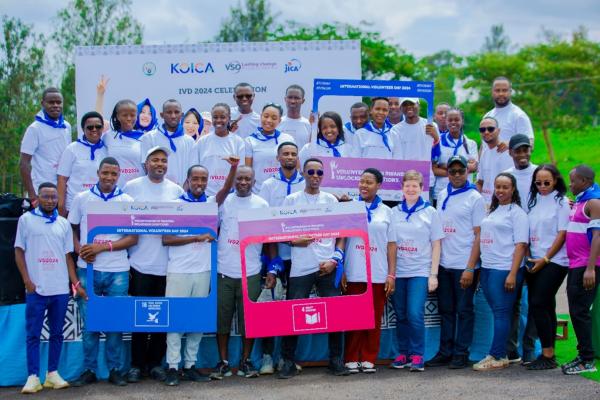
Working on this project has helped me significantly grow. Initially, I didn’t have experience working with vulnerable and marginalised communities, nor was I familiar with holding duty-bearers accountable, suppliers and partners.
VSO provided training in advocacy and tools like the community scorecard, which have greatly improved my communication and engagement skills. I’ve also benefited from continuous mentorship and training, which has refined my skills in monitoring, evaluation, and project management through community of practices (COPs) and catch up with line manager.
Can you describe your typical day at work?
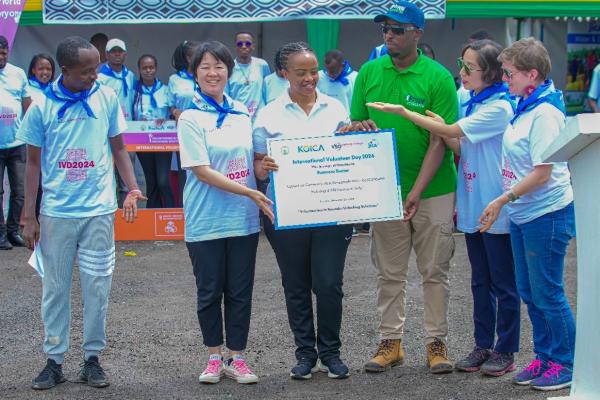
My typical day starts with travelling to work, checking emails and reviewing my calendar to prioritise the tasks. I review my daily plan, and work on my priorities for the day. If there's an upcoming activity, I’ll develop the terms of reference, get approval from my line manager, and prepare any logistics, ensure that procurement is done on time. Once those steps are completed, I’ll inform the partners or primary actors involved and plan for the field activities.
I have a lunch break after I check the progress on my priorities for a day. I ask for support from my colleagues in case anything needs to be sped up for that day. I collaborate with my colleagues (both staff and volunteers) and discuss on our work as well as listening to the suggestions and input of our primary actors. I work with my team, coaching them or seeking advice from them and my supervisor as needed.
My day can also start with fieldwork, after which I’ll return to the office to complete a report and plan for follow-up activities.
What is the most rewarding part of your job?
The most fulfilling part of my job is seeing the positive impact on the communities we work with, especially when the youth, girls, and people with disabilities are empowered to demand their rights. Witnessing lasting change in their lives gives me immense satisfaction.
What advice would you give to someone interested in working in the non-profit or development sector?
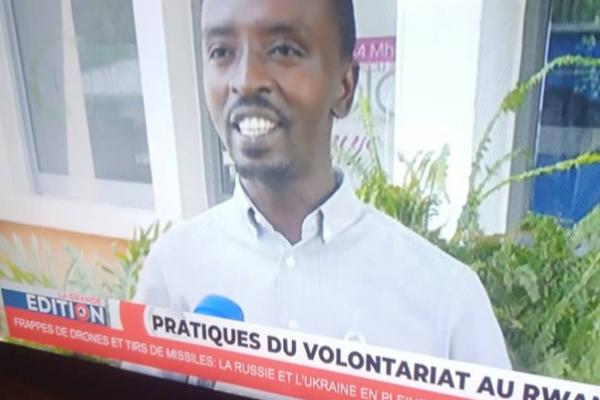
My advice would be to approach the work with a willing heart and be prepared to work hard, meet with people of diverse cultures, values and skills sets. Learn quickly and be open to consulting others for help. Remember to work with inclusive approach in mind, and not let anyone behind.
It's important to respect an NGO's code of ethics and policies and handle the donor relationships with care. Be an active listener with the primary actors, staff and volunteers and reflect on the work done together with them. Above all, you need to enjoy the work and be passionate about creating positive change through the project management cycle.
What are your aspirations for the next five to 10 years?
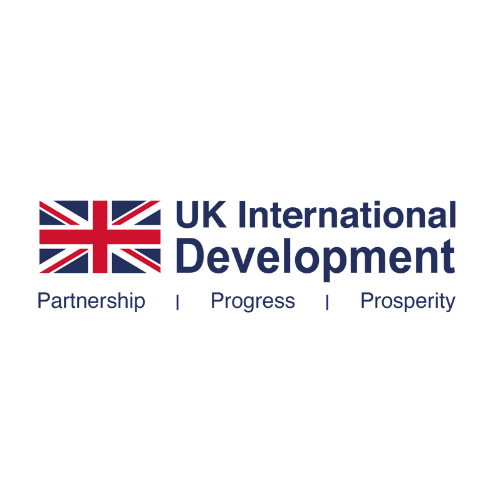
I want to continue growing professionally. I aspire to take on more leadership roles where I can help shape strategic decisions in a non-profit organisation. I also hope that VSO continues to secure more funding so that we can reach more communities, including people with disabilities to help them to become ACTIVE citizens. Ultimately, I want to see my career progress and VSO’s impact grow."
The ACTIVE programme
ACTIVE aims to reach 2.5 million people across 19 countries by mobilising marginalised groups, such as women, young people and those with disabilities, to act on the issues that are most important to them and their communities.
Read more
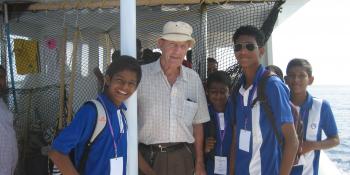
Transforming lives through education: Geoffrey’s VSO legacy
With a deep belief in the transformative power of education, Geoffrey from Norfolk, UK, has devoted his life both in the UK and abroad to making education more accessible for all.
